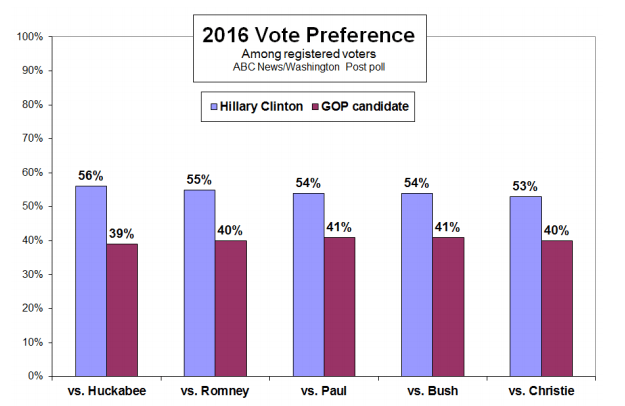Thursday Open Thread [1.22.15]

A new ABC News/Washington Post poll finds massive Clinton leads over every Republican candidate.
The poll finds that Hillary is “stronger in her base, backed by nine in 10 or more Democrats who are registered to vote, as well as by at least eight in 10 liberals and about six in 10 moderates.”
As with Barack Obama, the recovery helps Clinton. About three-quarters of registered voters who rate the economy positively support her, and she leads overwhelmingly among those who say they’ve gained ground financially under Obama’s presidency. But she also leads, by 16 to 20 points, among those whose finances have just held steady.
Clinton has a strong advantage among those who see income inequality as a major problem, and she runs essentially evenly vs. these potential Republican nominees among those who think it’s a problem, but not a major one. She trails only among those who don’t think the income gap is a problem – just 16 percent of registered voters.
Women favor Clinton by 20- to 24-point margins, men by non-significant 2- to 7-point margins. She’s also strong among racial and ethnic minorities, adults under 40 and lower-income voters.

Jonathan Chait on how history will judge President Obama and his legacy: “He has amassed a record of policy accomplishment far deeper than even many of his supporters give him credit for. He has also survived a dismal, and frequently terrifying, 72 months when at every moment, to go by the day-to-day media, a crisis has threatened to rock his presidency to its core. The episodes have been all-consuming: the BP oil spill, swine flu, the Christmas underwear bomber, the IRS scandal, the healthcare.org launch, the border crisis, Benghazi. Depending on how you count, upwards of 19 events have been described as ‘Obama’s Katrina.’”
“Obama’s response to these crises—or, you could say, his method of leadership—has been surprisingly consistent. He has a legendarily, almost fanatically placid temperament. He has now spent eight years, counting from the start of his first presidential campaign, keeping his head while others were losing theirs, and avoiding rhetorical overreach at the risk of underreach.”

The National Journal quotes a Republican Congressman, Rep. Charlie Dent, on how horribly the first weeks of the new Congressional session are going for the GOP:
“I prefer that we avoid these very contentious social issues,” said moderate Rep. Charlie Dent, reprising comments he gave in the closed-door conference meeting. “Week one, we had a speaker election that did not go as well as a lot of us would have liked. Week two, we got into a big fight over deporting children, something that a lot of us didn’t want to have a discussion about. Week three, we are now talking about rape and incest and reportable rapes and incest for minors. … I just can’t wait for week four.”

The day after Democrats lost the Senate, and handed the Republican Party its largest House majority in nearly a century, President Barack Obama stood at a podium in the East Room of the White House and radiated something just short of defiance. Nonplussed conservatives weren’t sure whether to be annoyed or thrilled—if Obama didn’t see danger for his party in the previous night’s returns, maybe he was stuck in the kind of bubble that cost Mitt Romney the presidency in 2012, and would weaken the Democratic position ahead of the next general election.
But Obama’s demeanor was rooted in two insights: first, the truism that midterm elections, and particularly the one just past, favor Republicans in a structural way; second, that an ongoing, durable burst of economic growth would eventually strengthen his political hand—perhaps to the point where Republicans could no longer afford to bat him about like a piñata without suffering at a national level.

Nate Cohn: “Only a handful of modern elections have not had an incumbent president on the ballot. In these contests, the president’s approval ratings are unsurprisingly less important than when a president is running for re-election. So Mr. Obama’s approval ratings will matter in 2016, but it is hard to say exactly how much.”
“The balance of evidence suggests that the break-even point for the presidential party’s odds of victory is at or nearly 50 percent approval. If the only thing you knew about the 2016 election was Mr. Obama’s approval rating on Election Day, you might guess that the Democrats had a 37 percent chance of holding the White House with a 46 percent rating — rather than a 23 percent chance with a 41 percent rating. The difference between 41 and 46 might be worth between one and two percentage points to the Democratic candidate in 2016 — the difference between a close race and a modest but clear Republican victory.”


